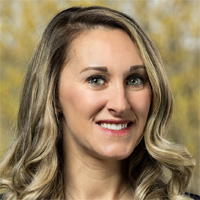How Women Can Get What They Want (and Need) from a Financial Adviser
Improving women’s experiences with financial professionals starts with honest conversations and some smart questions. And picking the right pro – one who knows how to listen – is critical.


Profit and prosper with the best of Kiplinger's advice on investing, taxes, retirement, personal finance and much more. Delivered daily. Enter your email in the box and click Sign Me Up.
You are now subscribed
Your newsletter sign-up was successful
Want to add more newsletters?

Delivered daily
Kiplinger Today
Profit and prosper with the best of Kiplinger's advice on investing, taxes, retirement, personal finance and much more delivered daily. Smart money moves start here.

Sent five days a week
Kiplinger A Step Ahead
Get practical help to make better financial decisions in your everyday life, from spending to savings on top deals.

Delivered daily
Kiplinger Closing Bell
Get today's biggest financial and investing headlines delivered to your inbox every day the U.S. stock market is open.

Sent twice a week
Kiplinger Adviser Intel
Financial pros across the country share best practices and fresh tactics to preserve and grow your wealth.

Delivered weekly
Kiplinger Tax Tips
Trim your federal and state tax bills with practical tax-planning and tax-cutting strategies.

Sent twice a week
Kiplinger Retirement Tips
Your twice-a-week guide to planning and enjoying a financially secure and richly rewarding retirement

Sent bimonthly.
Kiplinger Adviser Angle
Insights for advisers, wealth managers and other financial professionals.

Sent twice a week
Kiplinger Investing Weekly
Your twice-a-week roundup of promising stocks, funds, companies and industries you should consider, ones you should avoid, and why.

Sent weekly for six weeks
Kiplinger Invest for Retirement
Your step-by-step six-part series on how to invest for retirement, from devising a successful strategy to exactly which investments to choose.
The personal finance industry has improved its female-focused inclusion in recent years, but there is still work to be done. Whether it be one-on-one meetings where goals and priorities are not truly addressed or where a woman feels left out of the conversation, women report feeling as though they’re not receiving the same guidance they want and need from an adviser.
Nevertheless, demand is there. Findings from Fidelity Investments’ 2021 Women and Investing Study revealed that 77% of women believe if they had a financial adviser to help them invest, they’d be more confident about their financial picture.
My experience in wealth planning makes clear that every client, regardless of gender, has different wants and needs. I find clients are most comfortable contributing to conversations when all parties commit to discussing services, goals, priorities and dreams surrounding the client’s financial picture.
From just $107.88 $24.99 for Kiplinger Personal Finance
Become a smarter, better informed investor. Subscribe from just $107.88 $24.99, plus get up to 4 Special Issues

Sign up for Kiplinger’s Free Newsletters
Profit and prosper with the best of expert advice on investing, taxes, retirement, personal finance and more - straight to your e-mail.
Profit and prosper with the best of expert advice - straight to your e-mail.
For those seeking to nurture or improve relationships with female clients — and vice versa — keep these points in mind.
Qualities women tend to look for in advisers
Female clients are not a monolith, and no two women are the same, but studies demonstrate trends women look for in advisers. According to Fidelity Investments’ Investor Insight 2020 study, women choose an adviser based on their reputation, expertise and personal characteristics. I like to shorten this to a “know, like and trust” relationship.
What do they know about their adviser? What do they like? What do they trust? Is there a personal connection in addition to a business relationship? Reputation and expertise play a significant role, but if a woman does not feel a connection with an adviser, the relationship will likely not be fruitful. In comparison, men tend to choose an adviser based on specific assets and services offered. Statistically, women are not more likely to choose female advisers over male advisers, but rather individuals who satisfy the key “know, like and trust” factors.
Needs and services
Women want their investments and planning strategies to tie in with their values. An adviser may explain the best asset allocation or give advice on how the client’s portfolio should be structured, but unless they address how and why the complete financial plan is beneficial to and a reflection of her values, she may feel misunderstood or ignored in advising.
Getting to the root of the client’s values also opens the door for opportunities to educate them about their financial picture. For example, if a mother shares her priorities related to her children, she may be more interested in knowing how the investments and planning strategies benefit her family and children, as opposed to historical investment performance.
Many women want additional services to help navigate family dynamic issues, particularly regarding care for loved ones. Clients are often in situations where they’re caring for aging parents while simultaneously raising their own children. According to a recent Bank of America study on women and financial wellness, 58% of women who leave the workforce do so because of caregiving responsibilities. Working with an adviser to strategize care for a loved one will help mitigate financial and emotional stressors clients face.
Women also cite career coaching and salary/income coaching as services they find lacking with their advisers. For people who are still working, receiving feedback about how they can advance in their career or negotiate a salary to earn more money goes a long way in empowering them to advocate for their personal, professional and financial needs. Having this conversation and the others discussed here help build trust between the adviser and client.
Questions women should ask advisers early on
As described above, men and women differ in the qualities they seek in an adviser. Because of this difference, men and women often ask different questions when interviewing potential candidates. Women often focus on relationship-based questions while men ask more service-based questions. Below are several helpful questions women (and men) can ask to gauge their relationship with an adviser and the types of services and resources they can expect to receive. These questions might differ based on whether a client is looking to choose a new adviser or continue with an existing one.
If a client is looking to choose a new adviser, she might ask various questions related to expertise, scope of service and the adviser-client relationship, such as:
- Who is your typical client?
- What is the demographic you typically work with?
- How are you compensated?
- What does an engagement with you look like?
- What services do you provide? Will those services extend to my family?
- Do you ever partner with other professionals with different areas of expertise?
- How will you hold me accountable to my goals?
These questions lay the foundation for developing a road map for success, and help clients gain a clear understanding of what their goals are and how strategic partnership with an adviser will provide accountability for those goals.
Questions advisers should ask all their clients
From the beginning of their engagement, advisers should start by setting goals and getting to know their client. For existing relationships, it’s important to revisit these questions periodically:
- What’s important to you?
- What does investing do for your family?
- What are the goals for your family?
- What legacy do you want to leave for your children or grandchildren?
- How can I help you be accountable and achieve the goals we set forth?
By prioritizing these introductory questions from the start, advisers can establish a stronger foundation of trust and understanding with their clients.
Addressing both spouses in advising
Advising couples has greatly evolved. Fidelity Investments recently reported that over 70% of millennial women now invest outside their workplace retirement plans. That percentage just five years ago was only about half that figure. It’s essential that advisers work to engage both spouses to create a comfortable and inclusive environment.
In many married couples, husbands often take the reins in investment conversations with advisers, but this dynamic is changing. Women are increasingly becoming the family breadwinners, and women control nearly 90% of household budgeting decisions. Women also statistically outlive their male partners and, therefore, are likely to be responsible for their financial health longer into their retirement years. Engaging both spouses encourages a balanced level of input and allows the adviser to develop a more comprehensive planning strategy with the couple — one that honors all parties’ wants, needs and values.
Looking ahead
The industry has made strides toward more equitable conversations about women and finance, but there’s still much work to be done to foster environments that acknowledge and respond to women’s priorities and include them in decisions that ultimately impact their success and livelihood.
As advisers begin asking impactful questions and addressing both spouses when advising couples, women will be more equipped with the knowledge, tools and resources they need to ensure holistic financial planning is a meaningful, highly valued experience.
Profit and prosper with the best of Kiplinger's advice on investing, taxes, retirement, personal finance and much more. Delivered daily. Enter your email in the box and click Sign Me Up.

Ali Swart is responsible for strategic leadership and management of Waldron’s Wealth Planning Team, focusing on providing a world class financial planning and client experience. In addition to her management and leadership responsibilities, Ali simplifies the wealth complexities for a select group of multigenerational ultra-high net worth families. Ali also leads Waldron’s Diversity, Equity and Inclusion endeavors, co-hosts the Wealth Simplified podcast, and has a passion for increasing financial literacy and awareness.
-
 Nasdaq Leads a Rocky Risk-On Rally: Stock Market Today
Nasdaq Leads a Rocky Risk-On Rally: Stock Market TodayAnother worrying bout of late-session weakness couldn't take down the main equity indexes on Wednesday.
-
 Quiz: Do You Know How to Avoid the "Medigap Trap?"
Quiz: Do You Know How to Avoid the "Medigap Trap?"Quiz Test your basic knowledge of the "Medigap Trap" in our quick quiz.
-
 5 Top Tax-Efficient Mutual Funds for Smarter Investing
5 Top Tax-Efficient Mutual Funds for Smarter InvestingMutual funds are many things, but "tax-friendly" usually isn't one of them. These are the exceptions.
-
 Social Security Break-Even Math Is Helpful, But Don't Let It Dictate When You'll File
Social Security Break-Even Math Is Helpful, But Don't Let It Dictate When You'll FileYour Social Security break-even age tells you how long you'd need to live for delaying to pay off, but shouldn't be the sole basis for deciding when to claim.
-
 I'm an Opportunity Zone Pro: This Is How to Deliver Roth-Like Tax-Free Growth (Without Contribution Limits)
I'm an Opportunity Zone Pro: This Is How to Deliver Roth-Like Tax-Free Growth (Without Contribution Limits)Investors who combine Roth IRAs, the gold standard of tax-free savings, with qualified opportunity funds could enjoy decades of tax-free growth.
-
 One of the Most Powerful Wealth-Building Moves a Woman Can Make: A Midcareer Pivot
One of the Most Powerful Wealth-Building Moves a Woman Can Make: A Midcareer PivotIf it feels like you can't sustain what you're doing for the next 20 years, it's time for an honest look at what's draining you and what energizes you.
-
 I'm a Wealth Adviser Obsessed With Mahjong: Here Are 8 Ways It Can Teach Us How to Manage Our Money
I'm a Wealth Adviser Obsessed With Mahjong: Here Are 8 Ways It Can Teach Us How to Manage Our MoneyThis increasingly popular Chinese game can teach us not only how to help manage our money but also how important it is to connect with other people.
-
 Looking for a Financial Book That Won't Put Your Young Adult to Sleep? This One Makes 'Cents'
Looking for a Financial Book That Won't Put Your Young Adult to Sleep? This One Makes 'Cents'"Wealth Your Way" by Cosmo DeStefano offers a highly accessible guide for young adults and their parents on building wealth through simple, consistent habits.
-
 Global Uncertainty Has Investors Running Scared: This Is How Advisers Can Reassure Them
Global Uncertainty Has Investors Running Scared: This Is How Advisers Can Reassure ThemHow can advisers reassure clients nervous about their plans in an increasingly complex and rapidly changing world? This conversational framework provides the key.
-
 I'm a Real Estate Investing Pro: This Is How to Use 1031 Exchanges to Scale Up Your Real Estate Empire
I'm a Real Estate Investing Pro: This Is How to Use 1031 Exchanges to Scale Up Your Real Estate EmpireSmall rental properties can be excellent investments, but you can use 1031 exchanges to transition to commercial real estate for bigger wealth-building.
-
 Should You Jump on the Roth Conversion Bandwagon? A Financial Adviser Weighs In
Should You Jump on the Roth Conversion Bandwagon? A Financial Adviser Weighs InRoth conversions are all the rage, but what works well for one household can cause financial strain for another. This is what you should consider before moving ahead.